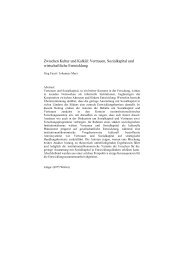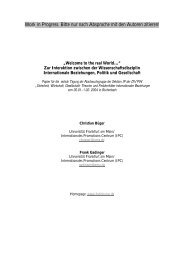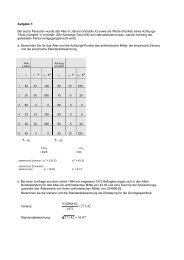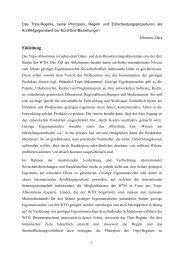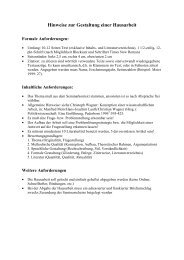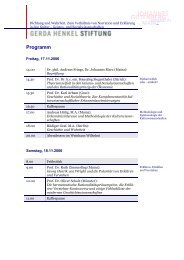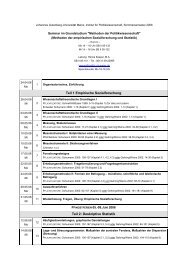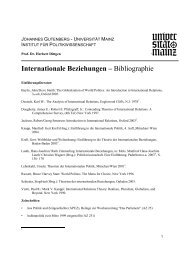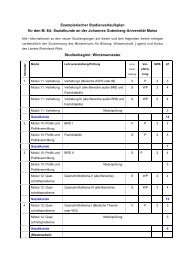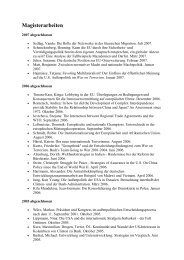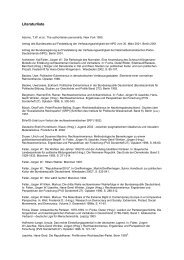Feedback Effects in Foreign Policy: A Framework for Analysis
Feedback Effects in Foreign Policy: A Framework for Analysis
Feedback Effects in Foreign Policy: A Framework for Analysis
You also want an ePaper? Increase the reach of your titles
YUMPU automatically turns print PDFs into web optimized ePapers that Google loves.
26<br />
1988). Other approaches focus more generally on how <strong>in</strong>dividual belief-systems change <strong>in</strong><br />
response to challenges stemm<strong>in</strong>g from the <strong>in</strong>dividual's environment (Levy 1994; Tetlock<br />
1991; Goldste<strong>in</strong>/Keohane 1993).<br />
Scholars have applied learn<strong>in</strong>g models to expla<strong>in</strong> the revolutionary changes under<br />
the Soviet regime of Mikhail Gorbachev (Breslauer/Tetlock 1991; Ste<strong>in</strong> 1994). Gorbachev’s<br />
“new th<strong>in</strong>k<strong>in</strong>g” often serves as an exemplary case to demonstrate an “<strong>in</strong>dividual learn<strong>in</strong>g”<br />
process which led to organizational learn<strong>in</strong>g and wide-rang<strong>in</strong>g political effects. These<br />
approaches then conceive of organizational learn<strong>in</strong>g as a bottom-up process which proceeds<br />
from the <strong>in</strong>dividual to the organizational to the governmental level, a process which can be<br />
blocked at any po<strong>in</strong>t of the cycle. Accord<strong>in</strong>g to Levy (1994: 288) “organizational learn<strong>in</strong>g<br />
<strong>in</strong>volves a multistage process <strong>in</strong> which environmental feedback leads to <strong>in</strong>dividual learn<strong>in</strong>g,<br />
which leads to <strong>in</strong>dividual action to change organizational procedures, which leads to a<br />
change <strong>in</strong> organizational behavior, which leads to further feedback.” Thus, as Thomas Risse-<br />
Kappen (1994) demonstrated <strong>in</strong> the Soviet case of Gorbachev’s Perestroika, a change of m<strong>in</strong>d<br />
alone does not suffice to challenge established organizational and governmental rout<strong>in</strong>es.<br />
Instead, to <strong>in</strong>stitutionalize that “New Th<strong>in</strong>k<strong>in</strong>g” <strong>in</strong> political contexts Gorbachev was<br />
dependent on Soviet th<strong>in</strong>k tanks and advisories which channeled these ideas <strong>in</strong> political<br />
structures.<br />
However, most of these accounts stay, by and large, faithful to the basic assumptions<br />
of rationalism. Accord<strong>in</strong>gly learn<strong>in</strong>g rarely if ever <strong>in</strong>volves a change or modification of<br />
agents' underly<strong>in</strong>g goals, i.e. rarely proceeds to the stage of reflexive or "complex learn<strong>in</strong>g" <strong>in</strong><br />
Deutsch's terms. Nonetheless they allow at least <strong>for</strong> the <strong>in</strong>corporation of a modicum of<br />
agency <strong>in</strong> rationalist theoriz<strong>in</strong>g about <strong>for</strong>eign policy <strong>for</strong>mulation because they acknowledge<br />
that learn<strong>in</strong>g processes, although faced with immense structural obstacles, can occur and are<br />
relatively open-ended. Learn<strong>in</strong>g decision-makers can break up the mechanistic feedback<br />
loops suggested by structuralist IR theoriz<strong>in</strong>g. They can observe the effects of <strong>for</strong>eign policies<br />
<strong>in</strong> the <strong>in</strong>ternational system; analyze their effects on the achievement of basic <strong>for</strong>eign policy<br />
goals; and strategically adapt <strong>for</strong>eign policy decisions <strong>in</strong> the light of these feedback effects,<br />
thus either strategically utiliz<strong>in</strong>g feedback effects to further their goals or deliberately<br />
attempt to break up positive or negative feedback loops that appear detrimental to goal<br />
achievement. A full analysis of feedback loops along these l<strong>in</strong>es would thus have to pay<br />
attention not only to the structural impulses and effects that may br<strong>in</strong>g about feedback loops;<br />
but also to how decision-makers, embedded <strong>in</strong> a variety of constra<strong>in</strong><strong>in</strong>g contexts, may learn<br />
from experience and history and attempt to manipulate the emerg<strong>in</strong>g feedback loops. To do<br />
so, researchers can rely on a multitude of analytic tools giv<strong>in</strong>g them access to learn<strong>in</strong>g




